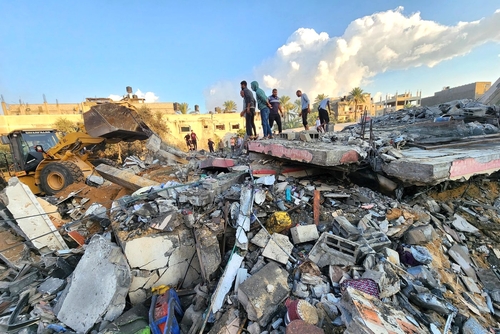Everyone seems to agree that no good outcome is possible in Gaza. They're wrong. It's possible for a decent Gaza-led administration to emerge, which could make autonomy and even statehood possible.
 Gazans stand by a destroyed building in Deir el-Balah on Oct. 15. |
That might seem unlikely, given the deep and longstanding anti-Zionism in Gaza. In 1967, Gazan school books taught arithmetic with problems like, "You have five Israelis. You kill three of them. How many Israelis are left to be killed?"
But over the past 15 years, Gazans have endured something monstrous and possibly unique in human experience: exploitation by their rulers as cannon fodder for public relations.
Tyrants treating their subjects as expendable to attain battlefield victory is routine—think Wagner Group prison recruits dying in Bakhmut, Ukraine. Hamas, however, uses civilians to score propaganda points. It attacks Israel to provoke retaliation, correctly expecting that the bombs, destruction and death will bring Iranian approbation, Islamist support, Muslim solidarity and leftist sympathy. After each attack, the narrative about culpability invariably shifts from Hamas to Israel.
Much evidence suggests that most Gazans don't want to serve as pawns in an obsessive and illusory jihad against Israel. Why suffer for a lost cause? "These people profess Islam and claim to be religious, but they slaughtered people," observes one Gazan.
Polling finds overwhelming support among Gazans for the statement that "Palestinians should push harder to replace their own political leaders with more effective and less corrupt ones." A July poll by the Washington Institute for Near East Policy found that 62% of Gazans want to keep a ceasefire with Israel and half want Hamas to stop calling for Israel's destruction.
 A scene from the Egyptian border where young Gazan men applied to emigrate in September 2023. |
For years, Gazans have voted with their feet. "Hamas has billions of dollars in investments in many countries, while people [in Gaza] starve to death and migrate in search of work," notes anti-Hamas activist Amer Balosha. Interviewedwhile waiting in long lines to leave in September, Gazans expressed despair. "All those who are seeking to emigrate want a dignified life . . . they are prepared to die." "I know I'm risking my life, but I want to leave, dead or alive."
Gazans led normal lives under Israeli rule; unsurprisingly, they want to do so again. Gaza and the West Bank in the 1970s, recounts historian Efraim Karsh, "constituted the fourth fastest-growing economy in the world—ahead of such 'wonders' as Singapore, Hong Kong, and Korea, and substantially ahead of Israel itself." Medicine, electricity, schools, literacy—all flourished. Gazans benefited from refrigerators and running water.
 The logo of the Islamic University of Gaza, the territory's first institution of higher learning, four different ways announces its 1978 founding date. |
Israel failed to find decent partners during its previous occupation, when it made no effort to cultivate friendly relations with Gazans and handed the territory to Yasser Arafat. Hamas has now done Israel's work. Where is Gaza's Konrad Adenauer?
Mr. Pipes is president of the Middle East Forum.
Oct. 17, 2023 addendum: I have collected what others have to say on this topic at "Comments on a Decent Outcome in Gaza."